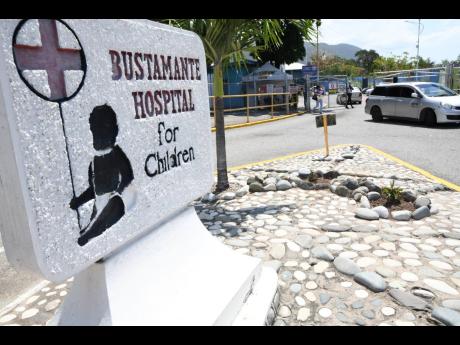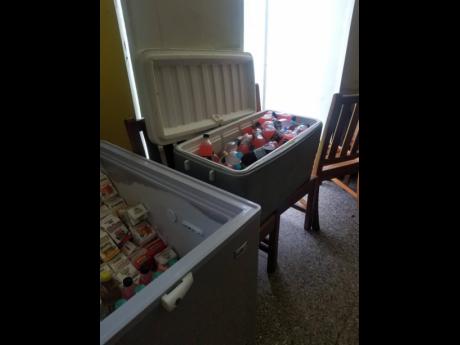‘The blood of Jesus is against that lying tongue!’
School administrator denies breaching sugary drinks ban; several institutions found not adhering to protocol
Faced with an increase in the childhood obesity rate on the island, Jamaica, in 2019, banned sugary drinks in schools and public health facilities, but a wide variety of overly sweetened beverages are still being sold at these institutions. An...
Faced with an increase in the childhood obesity rate on the island, Jamaica, in 2019, banned sugary drinks in schools and public health facilities, but a wide variety of overly sweetened beverages are still being sold at these institutions.
An undercover probe by The Sunday Gleaner at four educational facilities and the Bustamante Hospital for Children in St Andrew found that they were still selling large quantities of sodas; bottle, box and bag juices; and flavoured water with high sugar content, accessible to children, staff, patients and members of the public.
The sugary drink ban, which was spearheaded by the health ministry, stated that as of January 1, 2019, beverages on sale by vendors and concessionaires at these facilities should not contain more than six grams of sugar per 100 millilitres.
With a gradual approach to reduce sugar consumption, the policy also stated that for 2020, the sugar content should not exceed five grams per 100 millilitres and for the following two years should not surpass four grams per 100 millilitres, while for 2023 it prohibits any beverage over two and a half grams per 100 millilitres.
However, because of the COVID-19 pandemic, adjustments were not made beyond the 2020 five grams per 100 millilitres stipulation.
In announcing the measure in 2018, Health Minister Dr Christopher Tufton raised concerns about the obesity rate in children and their high consumption of sweetened products.
He cited a 2017 Global School-Based Health Survey, which indicated that the prevalence of obesity in Jamaican adolescents 13 to 15 years increased by 68 per cent and doubled in boys over the previous seven years.
The minister also shared that “approximately 70 per cent of Jamaican children consume one or more sugar-sweetened beverage per day and 77 per cent of our adults consume one or more sugar-sweetened beverage per day”, while noting that the consumption of one or more servings of sugar-sweetened beverages per day is associated with a 26 per cent greater risk of developing type 2 diabetes.
MOST IN BREACH
Last week, The Sunday Gleaner visited one health facility, a basic school, a preparatory school, a primary and a high school in St Andrew to assess whether the institutions were complying to the policy.
At the country’s main children and sole specialist paediatric hospital, two cafeterias were observed on site, both offering beverages that should not be allowed for sale, such as sodas and fruit drinks. Plain water and box milk were the only acceptable beverages being sold.
At one of the concessionary operations, the cashier, when asked whether she had any drinks with reduced or no sugar, indicated that the only thing that she had was diet soda, but after checking, found that she was out of stock. She was overheard telling a customer that she was also out of coconut water.
Checks made on the label of a soft drink that was purchased showed a serving amount of 600 millilitres with a total of 55 grams of sugar.
A 500-millilitre fruit drink that was purchased by a security officer had 25 grams of sugar.
At the other concessionary outlet, which also sold flavoured water, sweetened milk product and box milk, the cashier indicated that she did not have anything with reduced sugar. A 355-millilitre soda that was purchased contained 38 grams of sugar.
The Sunday Gleaner was unable to reach hospital CEO Camile Wallen Panton despite multiple attempts.
At a popular all-girls high school, the tuck shop offered a variety of sodas and fruit drinks. Several boxes of sodas and flavoured water were observed in the storage room. A peek inside the deep freezer also revealed several high-sugar box juices.
Only one drink purchased contained the accepted sugar content. Students were observed drinking beverages, such as bag juice, soda and fruit drink that exceeded the stipulated sugar level.
Interestingly, while the label on one bag juice – that a student said she bought at another shop on the compound – showed that it contained sugar, sodium benzoate and citric acid, it did not indicate the level of the sugar content.
Efforts to speak with administrators were also unsuccessful.
A concessionary operation at a popular primary school visited by our news team revealed that, for the most part, sodas and other overly sweetened beverages were not being sold to children.
A staff member there indicated that he was aware of the ban on sugary drinks, hence they try to conform. However, the tuck shop was observed selling sweetened flavoured water, with a 600 millilitre-sized bottle containing 35 grams of sugar.
A female vendor was also seen on the compound selling sodas. When questioned, she said it was solely for the teachers, as she tried to offer the children healthier choices.
The ban, however, is applicable to all areas in and around schools and even during special school events.
Two crates of sodas were observed being transported upstairs to one of the classrooms.
The school principal, while declining to comment on the overall breaches, said the drinks were for the Grade Six Achievement Test blow-out that was being held for the finalising students. According to her, she would first need to seek legal advice before commenting.
‘A BIG LIE’
A stop was also made at a well-known preparatory school and a visit to their tuck shop revealed that students were mainly being sold flavoured water, fruit drinks and plain water. A small drink purchased, which contained a serving of 330 millilitres, like the flavoured water, was found to contain 26 grams of sugar.
When contacted, an administrator at the school said they were aware of the policy and try to conform but were of the understanding that beverages purchased from the manufacturers would have met the required standards.
But going forward, the administrator, said, “I will definitely monitor what is being sold more closely and will get back to the companies and remind them that whatever is being sold must be within the government guidelines.”
A breach of the sugary drink ban was also observed at an early childhood centre. Checks made at the tuck shop revealed that one brand of soft drinks was being sold. But the principal, who was nearby, when asked if sodas were being sold to students, quickly shouted, “No! We don’t promote that here!”
She was later contacted and asked to respond, as the school would have been in violation of the ban, but denied committing a breach and labelled the reporter who had visited the school a liar.
“That liad woman weh come and say wi a sell soda! Wi nuh sell nuh soda here and she ask if wi sell soda and wi tell her wi nuh sell soda to children. Children bring their own snacks and wi tell our parents do not give our children sodas!
“We had sports day and we had one deggeh deggeh case of sodas and water! The blood of Jesus is against that lying tongue and that lying spirit!” she said before abruptly ending the call.
Under the policy plan, public-health dieticians and nutritionists, as well as guidance counsellors and principals, were to monitor, enforce and encourage compliance with the sugary drink ban and encourage healthier choices.
When asked about external monitoring, the high school administrator said that no one had visited the schools since 2019, but she reasoned that might be because of the COVID-19 pandemic.
At the children’s hospital, both concessionaires said no one has visited the shops to check whether beverages were in line with the allowable sugar content level.


